Edie Melson's Blog, page 215
December 30, 2019
Still Time to Nominate The Write Conversation!

Please remember to nominate The Write Conversation for Writer's Digest Top 101 Sites for Writers!
This year it's easy, just send an email. They're also asking for suggestions for categories. Here's a link to the entire Writer's Digest article: Call for the Best 101 Websites for Writers Nominations.
If you don't have time to read the article, here's the short version of how to nominate us:
Send your nominations to Writer's Digest at:
wdsubmissions@aimmedia.com
with the subject line:
101 Best Websites Nomination.
Whether we make the list or not, I want to thank you for being the BEST writing community on the web!
Blessings,
Edie
TWEETABLE
Help us spread the word! Nominate The Write Conversation for the Writer's Digest top 101 Sites for Writers - @EdieMelson (Click to Tweet)
Published on December 30, 2019 22:00
December 29, 2019
Intentional Consistency—A Writer's Best Plan for the New Year
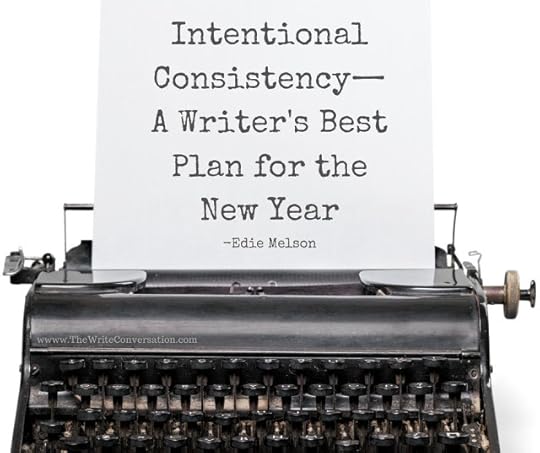
By Edie Melson @EdieMelson
The title of this post may seem too obvious to merit mention, but I would beg you to stick with me. Life these days is incredibly busy. We’re subdividing our time into smaller and smaller portions, leaving us with just more details to keep track of.
But I would propose that worked-in-between-the-insanity isn’t where our writing belongs. We have been given a gift and entrusted with a calling. I’ve come to believe it’s poor stewardship on my part to ignore that. So I’ve decided to begin the practice of writing with intentional consistency.
But all around, no matter my good intentions, life continues to loom and intrude.
So how am I putting intentional consistency into practice?
1. I’ve determined my most creative hours of the day and blocked them off on my calendar. For me it’s the morning—anytime before noon. Truthfully, I’m not able to spend every single morning writing, but with the time blocked off, it makes me weigh other opportunities differently.
2. I set weekly goals. I prefer weekly over daily goals because they’re easier to meet. If I miss a day for some reason, I still have the rest of the week to meet the expectations I’ve set. Sometimes I structure my goals around word count, but not always. Right now I’m working on a series of devotions, so I have a set number I want to finish editing each week.
3. I write regularly. No, I don’t always write something every day. I believe writers should have a Sabbath rest. But I write when I don’t feel like it, as well as when I feel like it. Hear my heart on this. We are all busy. We all have important things that need doing. But if we’re going to call ourselves writers then writing MUST be one of those things. We can’t just talk about writing, critique other writers, or plan to write when life slows down. If we choose that attitude then we’re no better than the rich man in Luke 12 who was planning to build bigger barns. We are not promised tomorrow and we’ve got to quit squandering today.
4. I respect my calling. This is an attitude change for me. Through prayer and study, I’ve determined that God expects me to be obedient. I know, not a huge revelation, but just wait. That obedience isn’t supposed to only be in regard to the hard or the difficult things in my life. Obedience is foundational to everything. You see, I love writing and because it’s fun, I had developed the idea that it wasn’t important. And by the way, this has nothing to do with whether or not I'm making money with my writing. It has to do with obedience only.
5. I’m willing to let God set my priorities, even when it means saying no. I’m doing my best to model my life on Jesus. As I’ve studied His life, I’ve realized that He was not constrained by someone else’s agenda—even when it was urgent. He walked away from crowds who needed healing, those who were hurting, even disciples who were confused. Only God set His priorities. Everywhere around us are ministries that need workers, children who need babysitting, and loved ones who need help. I am not God. I cannot be everywhere at once. God is the only one who can make sense of all the needs surrounding me. When He says no, I go with it. When He says write, I sit down and write.
6. I’ve enlisted a team. Actually, I have a couple of them. I have a prayer team who pray specifically for me and my writing ministry. I also have a group of writers that I meet with regularly. Both groups hold me accountable and help me remember my priorities. They also give me the perspective I need to make wise choices.
7. I now take time off. I’ve tried to work every waking hour I can, and it just doesn’t work. I’m not capable of sustaining that time of schedule. It makes me cranky, tired, and generally difficult to live with. It’s also NOT fair to my family and friends. Relationships do matter. When my life is out of balance, my calling isn’t the only thing that suffers.
8. I nurture my relationship with God. This is foundational and without it, numbers 1 through 7 are meaningless. I make regular times of prayer and study a priority. I’ve discovered—the hard way—that the crazier life gets, the more time I need with God.
None of these eight things is earth shattering, in fact they’re fairly obvious unless we’re applying them to ourselves. For me though, they required a dramatic shift in thinking and acting. I’d love for you to share your thoughts on intentional consistency in your writing life. Be sure to share your comments in the section below.
Don’t forget to join the conversation!Blessings,Edie
TWEETABLE
Intentional Consistency—A Writer's Best Plan for the New Year - @EdieMelson (Click to Tweet)
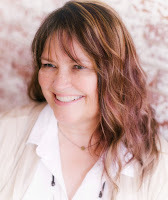 Edie Melson is a woman of faith with ink-stained fingers observing life through the lens of her camera. No matter whether she’s talking to writers, entrepreneurs, or readers, her first advice is always “Find your voice, live your story.” As an author, blogger, and speaker she’s encouraged and challenged audiences across the country and around the world. Her numerous books reflect her passion to help others develop the strength of their God-given gifts and apply them to their lives. Connect with her on her website, through Facebook, Twitter and Instagram.
Edie Melson is a woman of faith with ink-stained fingers observing life through the lens of her camera. No matter whether she’s talking to writers, entrepreneurs, or readers, her first advice is always “Find your voice, live your story.” As an author, blogger, and speaker she’s encouraged and challenged audiences across the country and around the world. Her numerous books reflect her passion to help others develop the strength of their God-given gifts and apply them to their lives. Connect with her on her website, through Facebook, Twitter and Instagram.
Published on December 29, 2019 22:00
December 28, 2019
Embracing the New Directions God Has for Us

by Edie Melson @EdieMelson
The writer’s path is a journey of a lifetime—one fraught with discovery and discouragement. We can avoid some of its pitfalls if we define that path early on. Today, I want to share some insights into my writing journey and the markers I look for to help me stay at least in the vicinity of the path.
This time of year, between Christmas and New Year's, my thoughts turn backward. I use this time to evaluate the past year and prepare for the next
one. I've given up New Year's Resolutions completely and find the freedom from those expectations (and failures) a major relief.
But I have implemented something else instead. My husband and I spend some time looking back at our spiritual markers for the past year. We evaluate them individually, as a couple and as a family. I also look at them in regard to my past year as a writer.
This is particularly helpful, because staying on the writer's path is difficult because each of our paths are so unique and varied. In the past I've had trouble evaluating my progress because I was comparing my journey to someone else's. I’ve come up with some questions to help me process where I’ve been and where I’m headed.
Questions to Get Me StartedWhat were some of my writing successes this past year? (Not necessarily the most lucrative, but the most rewarding) What were some of my writing setbacks this past year? What writing advice stands out in my mind because it seemed to have been aimed directly at me? What brought me the most joy? (Writing related) As I map out these spiritual markers, the path God has had me on becomes quite clear. And, by knowing where I've been, it becomes clearer where to go next.
The other thing I do this time of year is to choose my ONE WORD and SCRIPTURE for the next year. I've been choosing a Bible verse for the upcoming year since 1996, but I just started choosing a single word to go with it since 2012. My close writing friend Beth Vogt started me on it and the practice has proved invaluable.
My Unexpected Word of the Year
I had a preconceived idea of what my word for 2020 should be. I began to pray over things like focus, discipline, and peace, but nothing resonated. Then as I was asking God where to look for my word, He gave it to me.
Just like that, the word exploded into my mind along with a Bible verse.
BEHOLD I am doing a new thing;
now it springs forth, do you not perceive it?
I will make a way in the wilderness
and rivers in the desert.Isaiah 43:19 (ESV)
This word is so perfect for me. This next year is shaping up to be a year like none yet. It's full of exciting—scary—things, and this is exactly the kind of confirmation I needed to face it with faith.
So what's ahead?
First, I'm directing (or co-directing) 10 events this year. And only 5 of them are writing related.
Writing Events January 17-20 Mountainside Marketing Retreat : an event I'm co-directing with DiAnn Mills. It's geared to writers who want in-depth, hands on instruction for social media, marketing, blogging and branding.
May 24-28, Blue Ridge Mountains Christian Writers Conference: an event I'm directing with DiAnn Mills. This multi-discipline writing conference is now the largest Christian Writers Conference in the country.
August 30-September 2, Mountainside Nonfiction Retreat: an event I'm directing with DiAnn Mills. This is a hands on event for writers who want to strengthen their nonfiction techniques and learn how to earn money in the process.
October 4-7, Mountainside Novelist Retreat: as DiAnn Mills and I direct this event we guide writers into the intricacy of fiction writing.
November 8-11, Mountainside Speakers Retreat: DiAnn Mills and I are directing this with the amazing industry professional Karen Porter. This is our fourth retreat and is aimed at equipping writers to speak.
Photography EventsIn addition to writing, God has thrown open the doors for my love of photography. Ridgecrest Conference Center has engaged me to direct 4 photography workshops. Each one is a 26 hour event in each season of the year. They're planned to coincide with a full moon and include instruction, photography time and editing basics.
February 9-10, The Snow Moon
April 6-7, The Pink Moon
August 2-3, The Sturgeon Moon
November 1-2, Harvest Moon
Creative EventsFinally, with my new series, Soul Care (with Bold Vision Books), God gifted me with the ability to share my love of creativity with others. The event I'm directing is
July 17-19, Soul Care: A Weekend to Play & Connect with Our Creative Father
Bullet Journaling ClassesI'm also teaching a series of local classes at Fiction Addiction in Greenville SC for Bullet Journaling. While these events are currently in-person classes, I'm working with Fiction Addiction to see if we can include online instruction some time in the future.
I'll also be keeping up my regular travel schedule. This is going to be a crazy, wonderful year. I may find at the end of it that it's time to do some pruning, and I'm fine with that. But life is definitely heading in new directions.
I'd love for you to share your ONE WORD and/or Bible verse for the year, and hear some of your answers to these questions.
Don’t forget to join the conversation!Blessings,
Edie
TWEETABLE
Embracing the New Directions God Has for Us - @EdieMelson (Click to Tweet)
Published on December 28, 2019 22:00
December 27, 2019
TL;DR—Too Long; Didn't Read
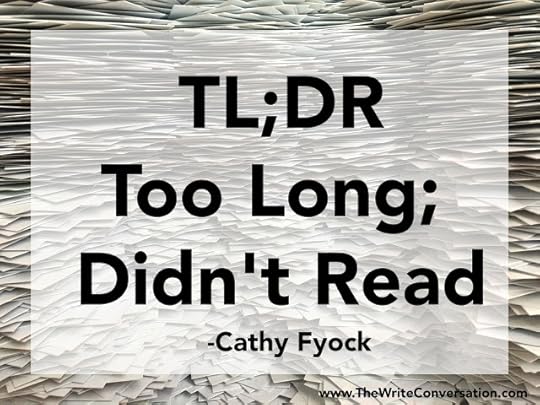
by Cathy Fyock @CathyFyock
Too long; didn’t read, or TL;DR has become shorthand for writing which is overly verbose. Congruent with Strunk and White’s admonition to “omit needless words” and with Einstein’s statement, “Everything should be made as simple as possible, but no simpler,” TLDR (or “Teal Deer”) has a long history of use on the Internet as shorthand for the need to summarize and abbreviate.Aspiring authors often ask me how long their book should be, and the simplest answer is, “as long as it needs to be.” Readers today want accessible, practical books, and often praise the “one-flight” books that can be read and digested in one leg of a business trip.
When asked this question about book length, I often think about a book I bought at the ATD conference where I spoke several years ago. I heard an excellent speaker, Andre Vermeulen, Ph.D., speak about the topic of his book, Tick Tock This Makes Your Brain Rock. I paid about $14 for this ultra-slim volume which encompasses about 50 pages and, since it is loaded with photographs and illustrations, probably only contains about 5000 words. Did I feel shortchanged? Not in the least! This book was the perfect summation of Vermeulen’s excellent presentation, and gave me precisely the information I was seeking when I bought the book.
On the other end of the spectrum, I think about an advance copy of a new book I was given at a conference, authored by a well-known speaker. I was asked to sign on to her advance promotion team, and I excitedly did so. I lugged the thick volume home, and received a call from her promotion team.
“What do you think of the new book?” the excited promotion team member asked me.
“To be honest, the book is still sitting here on my desk. I was really excited about receiving it, but it is so big and intimidating I can’t even begin to consider reading it.” The thought of lugging it on my next trip was equally daunting. To be honest, I never did read that book, and I probably never will.
The moral of this story: less is more. As a rule of thumb, 100 – 150 pages, or 35,000 to 52,500 words is a typical length today, although there is no hard and fast rule. When I attended a recent conference program about book length, I’ve heard speakers talk about books that are now being re-released as two or three much shorter versions.
Some questions to ask yourself as you consider your book’s length:Have I answered the my readers’ questions?Have I given my readers enough information to be valuable?Have I adequately covered the most important elements of my topic?
Perhaps the most important question is this one: Have I left my reader wanting more?
TWEETABLE
TL;DR—Too Long; Didn't Read - @CathyFyock on @EdieMelson (Click to Tweet)
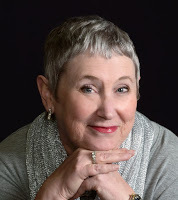 Cathy Fyock is The Business Book Strategist, and works with professionals and thought leaders who want to write as a business development strategy. She is the author of nine books, including her most recent with coauthor Lois Creamer, The Speaker Author: Sell More Books and Book More Speeches. Since starting her business in 2014 she's helped more than 150 professionals become published authors. You can reach her at Cathy@CathyFyock.com.
Cathy Fyock is The Business Book Strategist, and works with professionals and thought leaders who want to write as a business development strategy. She is the author of nine books, including her most recent with coauthor Lois Creamer, The Speaker Author: Sell More Books and Book More Speeches. Since starting her business in 2014 she's helped more than 150 professionals become published authors. You can reach her at Cathy@CathyFyock.com.
Published on December 27, 2019 22:00
December 26, 2019
Whether You’re Walking or Writing, the Journey’s the Same

by Lori Hatcher @LoriHatcher2
When you walk in endless circles on an indoor track, there isn’t much too look at, so you study people. Record cold forced my husband and me to abandon our morning walks in the neighborhood and retreat to the shelter of a nearby recreation center. Within three days, I’d identified the regulars and learned their names. Watching them, I realized that a writers’ life lesson was playing itself out in front of me.Pat is the first man on the track each morning. He’s recovering from a recent health setback and walks with a stutter step, cradling his left arm close to his chest. Exercise isn’t fun or easy for him, but he knows it’s important. Before I can stuff my ear buds in my ears and click Play, he’s already begun his laborious trek around the track.
Like Pat, writers often encounter setbacks on their journey. Maybe every editor on our list rejects the manuscript we’ve labored over for years. Disappointment cripples us, making forward progress hard. Some days we struggle to bang out a coherent sentence. We find it hard to bounce back from a rejection. Pat’s example reminds me to look at rejections as redirections and persevere, even when it’s hard.
Betty was one of the first walkers we met at the center. Petite and grey haired, this spunky grandma has to be in her mid-seventies. She’s not fast, nor is she graceful, but she’s committed. Thousands of walkers have come and gone over the years, but Betty’s outlasted them all. She’s walked one mile a day, every day, for the past 15 years. She estimates she’s walked more than 5,400 miles—one mile at a time.
Betty reminds me that slow and steady also wins the publishing race. We may not be the fastest or the flashiest writer, yet if we write 200 words a day, we can complete a 73,000-word manuscript in a year. If we write 250 words a day and take the weekends off, we can still complete a 65,000-word manuscript in twelve months.
I urged a friend to take the plunge and write the book she’s always dreamed of writing. “It’ll take me five years to write a book! Do you know how old I’ll be in five years if I write a book?”
“Do you know how old you’ll be in five years if you don’t write a book?” I asked. She found it hard to argue with my logic.
Margie and Mert arrive at the rec center together, walk in step, and hold each other accountable to show up every day. Although the sign clearly says, No walking abreast, they do it anyway. They’ve discovered that those who exercise with a friend are less likely to quit.
Margie and Mert’s partnership looks a lot like writers who have discovered the joy of writing with a buddy. Writing compatriots cheer us on by their example, nudge us when we get lazy, and refuse to let us quit. When their career speeds up, they bump draft us, introducing us to agents, editors, and markets we could have never met on our own.
Sidney’s another regular to the track. I secretly call him Superman. Every time he whizzes by, I remember those famous words, Faster than a speeding bullet . . . . I don’t know if he can leap tall buildings in a single bound, but he can pass most of us twice in one lap. If I had to pick him out of a lineup, I could do it – if I was allowed to identify him from the back. It’s the only view of him I’ve ever seen.
We’ve all encountered Sidneys on our writing journey. They’re at the pinnacle of their career, cranking out books faster than we can write a grocery list. They write, speak, podcast, consult, teach, and edit—and look good while doing it. Barely breaking a sweat, they leap over publishing hurdles, dodge rejections, and cross the finish line before we finish our one sheet. Their success both intimidates and encourages us, making us wonder if we could ever do what they do.
My last walker/writer comparison is a new visitor to the gym. She generated a lot of attention recently, looking like she’d stepped off the pages of Runner’s Monthly. She wore cool clothes, expensive running shoes, and a fancy watch that measured her heart rate, cardiac output, calorie burn, and oxygen levels. She hit the track at a fast clip but left twenty minutes later, exhausted and shaking her head. “I quit,” she muttered. “I don’t want to do this anymore. It’s too hard.”
The writer equivalent of Miss Runner’s Monthly buys all the right stuff, attends a writers conference or critique group meeting, and wins a contest or two, but because she doesn’t consistently show up, she doesn’t succeed.
Pat, Betty, Margie, Mert, and Sidney are inspiring examples of people who set goals and worked toward them—in their own way and at their own pace. Miss Runner’s Monthly reinforced what I suspected—the only way to fail is to quit.
Where are you on your writing journey? Gaining ground after a setback? Slowly making progress? Paired with a buddy, or zipping long?
Regardless of what goes on around you, set your eyes on your goal and keep writing. Don’t compare yourself to others. Recognize that Christian publishing is a team effort. When one writer wins, we all win. We’re members of the same team striving to reach the prize—together. And what a prize it will be.
The apostle Paul, one of the greatest writers of all time, summed it up this way: “Not that I have already obtained all this, or have already arrived at my goal, but I press on to take hold of that for which Christ Jesus took hold of me. Brothers and sisters, I do not consider myself yet to have taken hold of it. But one thing I do: Forgetting what is behind and straining toward what is ahead, I press on toward the goal to win the prize for which God has called me heavenward in Christ Jesus” (Philippians 3:12-15).
Writers ready? On your mark, get set, WRITE!
TWEETABLEWhether You’re Walking or #Writing, the Journey’s the Same - @LoriHatcher2 on @EdieMelson (Click to Tweet)
 Lori Hatcher is the editor of Reach Out, Columbia magazine and the author of several devotional books, including Hungry for God … Starving for Time, Five-Minute Devotions for Busy Women , the 2016 Christian Small Publisher Book of the Year. Her most recent book, Refresh Your Faith – Uncommon Devotions from Every Book of the Bible releases in the spring of 2020 with Our Daily Bread Publishing. A blogger, writing instructor, and inspirational speaker, Lori’s goal is to help busy women connect with God in the craziness of everyday life. You’ll find her pondering the marvelous and the mundane on her blog, Hungry for God. . . Starving for Time . Connect with her on Facebook, Twitter (@LoriHatcher2), or Pinterest (Hungry for God).
Lori Hatcher is the editor of Reach Out, Columbia magazine and the author of several devotional books, including Hungry for God … Starving for Time, Five-Minute Devotions for Busy Women , the 2016 Christian Small Publisher Book of the Year. Her most recent book, Refresh Your Faith – Uncommon Devotions from Every Book of the Bible releases in the spring of 2020 with Our Daily Bread Publishing. A blogger, writing instructor, and inspirational speaker, Lori’s goal is to help busy women connect with God in the craziness of everyday life. You’ll find her pondering the marvelous and the mundane on her blog, Hungry for God. . . Starving for Time . Connect with her on Facebook, Twitter (@LoriHatcher2), or Pinterest (Hungry for God).
Published on December 26, 2019 22:00
December 25, 2019
When God Changes Our Plans

by Henry McLaughlin @RiverBendSagas
Several years ago, I had a plan and I was living it out. My plan was to work my second career for a Christian ministry until I retired and then enjoy a life of leisure. I was also writing as a side gig. Even I knew better than to quit my day job.
But God had other ideas. And I didn’t particularly agree with them. The situation reminded me of the story in Acts 16:6 where Paul wanted to preach in Asia, but the Holy Spirit prevented him.
His plan wasn’t my plan.
I chose to follow him. I really didn’t have a better alternative and I don’t think I could have talked him out of his plan anyway.
And he took care of me. He arranged for me to leave the ministry and to pursue writing full time. He planned each detail including making certain I had no gap in insurance coverage. He showed me he would meet my financial needs and have money left over to continue giving generously, more than I expected.
He needed two things from me. I had to let go of my ego and be flexible. And I had to trust him as he sent me off in an unexpected direction.
Proverbs 16:9 NLT reminds us, We can make our plans, but the Lord determines our steps.
I had to line up my steps with his. I look back now and see the disaster I might have ended up in if I’d stuck to my plan.
He changed my plan because he had a new purpose for me. Since he made the change the change, my wife and I are now more involved in Church than ever, particularly in the area of stewardship and helping people achieve financial freedom. He’s even opened new doors in writing to teach and coach and mentor, opportunities that wouldn’t be there if I had stuck to my agenda.
What I Learned
One Don’t be stubborn or prideful. Don’t rely on my own intellect. Stay in communication with him. Spend time building relationship with him. Rely on the Holy Spirit to guide me. Two Remain open and obedient. Even when I’m not sure or don’t understand. This is where our faith and trust in him are vital. I still make plans. Now I commit them to him and follow his guidance. I don’t want to miss him. Three Meditate on this Scripture from Proverbs 19:21 NLT You can make many plans, but the Lord’s purpose will prevail.I make his purpose my purpose. And I remind myself he has a much better way of achieving it than I could ever devise. “Comprehending God’s plan can wait; obeying God’s will cannot.” (Cara Whitney in Unbridled Faith, Thomas Nelson, 2018)
When was the last time you let go of your plans and let God determine your steps?
TWEETABLE
3 Things to Remember When God Changes Our Plans from Henry McLaughlin, @RiverBendSagas, on @EdieMelson (Click to Tweet)
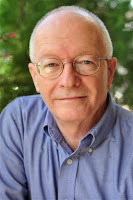 Henry’s debut novel, Journey to Riverbend, won the 2009 Operation First Novel contest.
Henry’s debut novel, Journey to Riverbend, won the 2009 Operation First Novel contest.Henry edits novels, leads critique groups, and teaches at conferences and workshops. He enjoys mentoring and coaching individual writers.
Connect with Henry on his blog, Twitter and Facebook.
Published on December 25, 2019 22:00
December 24, 2019
Merry Christmas!
Published on December 24, 2019 22:00
December 23, 2019
Dipping the Quill Deeper: Extolling Humility
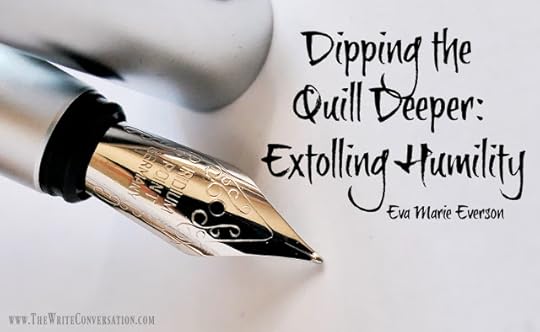
by Eva Marie Everson @EvaMarieEverson
A few years back I had the pleasure and honor of working on a project with Reverend Eric Eichinger who had been contracted by Tyndale Publishers to write a biography about Reverend Eric Liddell (1902 – 1945).
Thirty-one years after his death, Liddell had been made famous (again) by the 1981 movie Chariots of Fire , which told the story of his determination not to run on a Sunday, which he was slated for. Eichinger and I were to be a part of making him famous yet again with our book The Final Race (Tyndale, 2018).In the years leading up to the 1924 Olympics, Eric Liddell had trained as a 100-meter runner and had done well. He was “the man to beat.” The “Flying Scotsman.” And he was a shoo-in to bring glory back to a country beaten down by a World War. But then, upon hearing that his Olympic final was set on Sunday, Eric gave a flat “no.” This was the Lord’s day, he reminded the countrymen who, in hearing his decision, turned on him. He would not and could not take that lightly.
In spite of constant harassment and ridicule, Eric Liddel remained humble yet strong, unwavering in his convictions. In time, and after much prayer, he decided to train for the 400—an unheard and nearly ridiculous idea. Whoever heard of a 100-meter sprinter going for the 400? He would lose, for sure.
But Eric trained and he trained hard. And, as we all know from the movie (or history), he not only won the Gold, he broke all previous world records, breaking the tape in 47.6 seconds.
But Liddell was more than merely a national hero, Olympic gold medalist. He became a missionary to China (the land of his birth), and a writer. While serving in China at the onset of World War II, he sent his wife and their daughters back to her home country of Canada, while he determined to remain in service to God.
He, like many others, was subsequently interred by the Japanese in Weihsien Camp. While there, he wrote a book he’d been toying with for some time— The Discipline of the Christian Life —which outlined the Christian principles he’d set for himself his entire life, which was quickly coming to an end.
The book was published in 1985, something he would never be aware of. Not that it would have mattered to him—Eric was about extolling humility.
In the book, he wrote: Humility looks at its merits, gifts, and talents but also looks beyond them to God, the Author of every good and perfect gift, and renders all the glory to God (page37).
Eric knew he was a good runner. A good all-round athlete, in fact. To have denied that would have been absurd. And, I believe, that we—as writers—must acknowledge our own talents because to do so means to give God glory for them. By comparison, to not do so means to deny what God has done for you.
Look at your work. There are times, certainly, when we only bring half our best to the table. We all do this. We are in self-editing mode and we think, no, no, no. This is awful! I cannot believe I wrote this rubbish.
And it is. So, it must be rewritten!
But there are also times when we—go ahead and admit it—read over something we wrote and think wow! I wrote that?
I believe that our gift back to God for this rare and perfect treasure He granted to us is not only to use it for His glory—in whatever form that takes, whether you write articles, or children’s books, or bestselling works of fiction or nonfiction, or blog posts or Sunday school take-home papers—but also to acknowledge that He is the giver of this gift and that we do, in fact, own it.
And so I say: I am a writer.
I am a good writer.
I am a good writer who has been blessed by God with the rare and perfect gift of being able to see life through the lens of words.
To believe anything less isn’t humility at all. It’s denying God.
“Those who honor me I will honor.”(1 Samuel 2: 30b)
TWEETABLE
Dipping the Quill Deeper: Extolling Humility - insight from @EvaMarieEverson on @EdieMelson (Click to Tweet)
 Eva Marie Everson is the multiple award-winning and bestselling author of over 35 books, both fiction and nonfiction. She is the president of Word Weavers International and the director of Florida Christian Writers Conference and North Georgia Christian Writers Conference. Eva Marie and her husband make their home in Central Florida where they enjoy a lake view, their children, and grandchildren. They are owned by a very small dog.
Eva Marie Everson is the multiple award-winning and bestselling author of over 35 books, both fiction and nonfiction. She is the president of Word Weavers International and the director of Florida Christian Writers Conference and North Georgia Christian Writers Conference. Eva Marie and her husband make their home in Central Florida where they enjoy a lake view, their children, and grandchildren. They are owned by a very small dog.
Published on December 23, 2019 22:00
December 22, 2019
Publishing vs. Encouraging
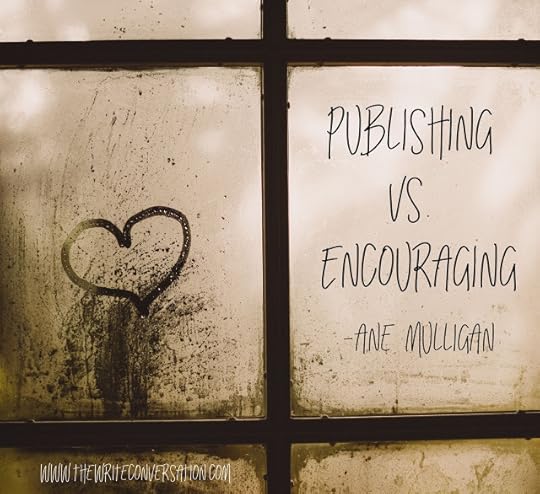
by Ane Mulligan @AneMulligan
According to a song lyric by Linda Rondeau:
Home, home in the industryWhere the writers and publishers playWhere seldom is heard An encouraging wordAnd the skies are so cloudy all day
Thanks, Linda for letting me borrow the lyric. Yes, I've experienced discouragement in my writing journey. Maybe it was a rejection, or comments from a contest judge, but they threw ice cubes on my dreams. But I soon realized discouragement was not getting me anywhere and definitely not published. So, after I kicked a cabinet or two, I pulled up my big girl britches, toned my rhino skin and got over it.
The thing is I’ve never want to be told my work is wonderful if it isn't. How mortifying would that be? And how untruthful by the teller.
Iron sharpens ironI was blessed to find critique partners who love me enough to push me hard. We can't get our feelings hurt if we're told something doesn't work—not if we're serious about publishing.
If you're serious, then you refuse discouragement. Turn your back on it, because it doesn't come from God.
Now, before y'all string me up, I realize new writers are more sensitive than the veterans. But if you really want to publish that puppy you've invested so much time on, you've got to get over it. This industry is subjective and it's competitive. To get ahead, you have to be one of the best.
So, here's my advice. When you get discouraged, follow these steps:
1. Set the critiques or judge's comments aside for 3 days.2. On the 4th day, take what profits your work and learn from it.3. Make Mardi Gras confetti out of the rest.
On the other side, if you're a critique partner or a contest judge, use care with your words. Be sure you are critiquing the work not the writer. You can be tough and still deliver it with a gentle, encouraging hand.
Proverbs 12:25 says "...an encouraging word cheers a person up." And that great theologian Mary Poppins said, "A spoonful of sugar helps the medicine go down." It's all in the manner the critique is delivered. Don't soften wise counsel, but deliver it with a loving heart.
Finally, if you're struggling with a sensitive spirit, read Proverbs through once with your writing career as the focus. Substitute the word "father" or "mother" with "critique partner" and "judge." Wow! What an eye-opener.
TWEETABLEPublishing vs. Encouraging - great tips from @AneMulligan on @EdieMelson (Click to Tweet)
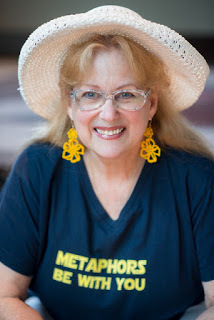 Ane Mulligan has been a voracious reader ever since her mom instilled within her a love of reading at age three, escaping into worlds otherwise unknown. But when Ane saw Mary Martin in PETER PAN, she was struck with a fever from which she never recovered—stage fever. She submerged herself in drama through high school and college. Years later, her two loves collided, and a bestselling, award-winning novelist emerged. She resides in Sugar Hill, GA, with her artist husband and a rascally Rottweiler. Find Ane on her website, Amazon Author page, Facebook, Twitter, Instagram, Pinterest and The Write Conversation.
Ane Mulligan has been a voracious reader ever since her mom instilled within her a love of reading at age three, escaping into worlds otherwise unknown. But when Ane saw Mary Martin in PETER PAN, she was struck with a fever from which she never recovered—stage fever. She submerged herself in drama through high school and college. Years later, her two loves collided, and a bestselling, award-winning novelist emerged. She resides in Sugar Hill, GA, with her artist husband and a rascally Rottweiler. Find Ane on her website, Amazon Author page, Facebook, Twitter, Instagram, Pinterest and The Write Conversation.
Published on December 22, 2019 22:00
December 21, 2019
Unselfish Love—the Beat Goes On

by Rhonda Rhea @RhondaRhea
Now that all my children are adults, I can tell you that raising the five of them was very often like a game of full-contact musical chairs. Without the chairs. It wasn’t so much about the wrestling—though believe me, there was plenty of that. But it was more about the music. Always even more of that. All three of my sons are in music ministries now and the two daughters are musical too. When Daniel, my youngest, was around twelve, he started drumming. He drummed on tables. He drummed on notebooks. He drummed on chairs. On his desk. On his dinner. On his sister. I don’t think there was any noun in his life that wasn’t a drum. I remember when we made cookies, the cookie sheet would suddenly become his drum. Okay actually, that one was more of a cymbal, but still. Percussion. Everywhere. All. The. Time.
Several times a week when my left eye would start to twitch—on the beat—I would say something like, “Son, do you even know you’re percussing?” He would look down at his hands, as if to, indeed, verify that it was true. It was always true.
It makes me wonder how many things I do without thinking even today. No doubt there are a gazillion annoying habits I’m not aware of that are causing eyes to twitch left and right.
Oh, that the Lord would grow me to the place where the things I do without thinking more often bless than annoy. In 1 Corinthians 12:31, Paul says, “And I will show you an even better way,” (HCSB). The Amplified calls that “even better way” a “still more excellent way, one of the choicest graces and the highest of them all: unselfish love.”
Then Paul begins the “love chapter.” Love should be a way of life for those of us who follow Christ. Loving others selflessly should happen as naturally and rhythmically as those tap-tap-taps on the table—loving almost without having to think about it—empowered by His indwelling Holy Spirit.
Verses 4-8 in that chapter tell us what that kind of love looks like: “Love is patient, love is kind. Love does not envy, is not boastful, is not conceited, does not act improperly, is not selfish, is not provoked, and does not keep a record of wrongs. Love finds no joy in unrighteousness but rejoices in the truth. It bears all things, believes all things, hopes all things, endures all things. Love never ends,” (HCSB).
How important is our sacrificial love for others to our Heavenly Father? We’re told in 1 Corinthians 13:1 that we could speak every language on earth—we could even speak the language of angels. But if we don’t love others, even “Angel-eese” sounds like a bunch of annoying noise. As a matter of fact, it says that without love, even if I’m speaking the sweetest language there is, “I am a sounding gong or a clanging cymbal.” The last thing I want is to cause a twitch in the eye of the God I love.
Lord, let me love others simply because I so love You. By Your enabling, may I love through You. Consistently. Steadily.
That’s my prayer. And I’m praying it happens all the time. Without missing a beat.
TWEETABLE
Unselfish Love—the Beat Goes On - @RhondaRhea on @EdieMelson (Click to Tweet)
 Rhonda Rhea is a humor columnist for lots of great magazines, including HomeLife, Leading Hearts, The Pathway and more. She is the author of 10 nonfiction books, including How Many Lightbulbs Does It Take to Change a Person? and coauthors fiction with her daughter, Kaley Faith Rhea. She and her daughters host the TV show, That’s My Mom, for Christian Television Network’s KNLJ. Rhonda enjoys traveling the country speaking at all kinds of conferences and events. She and her pastor/hubs have five grown children and live in the St. Louis area.
Rhonda Rhea is a humor columnist for lots of great magazines, including HomeLife, Leading Hearts, The Pathway and more. She is the author of 10 nonfiction books, including How Many Lightbulbs Does It Take to Change a Person? and coauthors fiction with her daughter, Kaley Faith Rhea. She and her daughters host the TV show, That’s My Mom, for Christian Television Network’s KNLJ. Rhonda enjoys traveling the country speaking at all kinds of conferences and events. She and her pastor/hubs have five grown children and live in the St. Louis area.
Published on December 21, 2019 22:00




